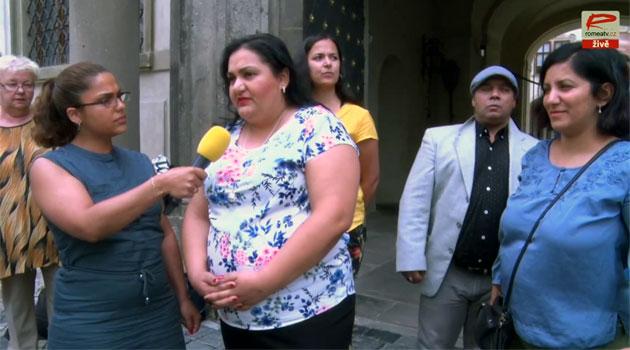Czech Republic: 88 cities in 12 regions plan to ban housing benefits in specific zones

The Institute for Social Inclusion (IPSI) reports that a total of 88 cities and municipalities in 12 regions are planning to announce or have already announced zones with increased incidences of undesirable phenomena where new applicants for housing benefits will not be allowed to receive them for residence at those addresses. The only regions where local authorities have not taken this step are the Pardubice and South Moravian Regions.
According to IPSI, the number of places where housing benefits cannot be disbursed is increasing and some local authorities have either adopted the measures or began considering adopting them prior to last month’s local elections. In the spring the number of cities and municipalities who already or were planning to designate such benefit-free zones was 71.
Any municipality can now designate places where public order is disrupted, where children are endangered, or where people are under the influence of alcohol and drugs as areas with undesirable phenomena. In such a zone, new applicants for the top-up housing benefit will not receive them.
“These measures have already been issued by 52 municipalities. The local elections were used by cities such as Most, Ústí nad Labem, Bruntál or Karviná, as an appropriate time to expand the existing areas to cover an even bigger area, in some cases the entire territory,” IPSI reports.
According to the Institute, larger places are predetermining the decisions made by smaller towns about whether to announce such zones on their territory, as smaller towns and villages become “dumping grounds for the poor” unless they adopt the zones themselves. According to a recent analysis commissioned by the Czech Labor Ministry, the number of so-called excluded localities doubled between 2006 and 2014 in the Czech Republic.
While 12 years ago there were about 300 impoverished buildings, neighborhoods and streets, eight years later there were 606 such areas. The ghettos were distributed across 297 cities and municipalities where as many as 115 000 people were residing.
In the year 2006, that number was 80 000 people. According to the annual report on the state of the Romani minority, half of all Romani people in the Czech Republic lived in social exclusion last year.
According to estimates by the regional coordinators for Romani minority affairs, that number was about 120 000 Romani adults and children. Representatives of IPSI and other organizations aiding people in adversity have repeatedly reported that just tightening the rules for welfare disbursal will not solve any problems in the Czech Republic and that people living in residential hotels and substandard housing will not access regular rental housing as a result.
Experts on social issues and several cities are calling for the creation of a social housing system. Currently the Czech Republic does not have one.
The Babiš Government pledged in its program declaration to draft a law on social housing. In the chapter on housing policy, the program declaration says that such a norm will address the needs of people living in adversity and on the outskirts of society, that it will create conditions for municipalities to address the issue, and that social workers would be deployed to work with social apartment tenants.
Babiš (ANO) recently said no such stand-alone law will be adopted and that the Government will concentrate on a program of building new units. Czech Labor and Social Affairs Minister Jana Maláčová (Czech Social Democratic Party – ČSSD) also spoke of “Turning around the trafficking in poverty and the trash”, i.e., dishonest landlords.
Representatives of that ministry have compiled a list of 15 measures for addressing the issue. They include regulating the leasing of multiple apartment units by licensed traders, establishing hygiene standards for apartment units, beefing up police and social work in the ghettos, and combining the two kinds of housing benefits into one.
The measures also include ensuring that the rules of neighborly coexistence are enforceable and ensuring that “all who are capable of working actually do so”. According to IPSI, it is not enough to rely on a few measures such as these and similar lists of steps to take will not aid the situation.
“The task of the Government is to establish systems and their financing. Bad addresses and no-go zones do not develop because of welfare. Without creating housing opportunities for those with low incomes, welfare plays the role of the only substitute for the lack of social housing,” the Institute said.
The disbursal of welfare has been tightened in recent years. In addition to the opportunity of declaring benefit-free zones, this June the housing top-up was lowered for tenants of residential hotels.
If people are unable to demonstrate their ties to municipality – such as being employed there or enrolled in school – they will not be eligible for benefits. Also, since the end of last year, part of the contribution toward subsistence made for those who have been drawing welfare for more than six months must be disbursed in vouchers, not cash.
Such persons in need must also perform at least 20 hours of community service or risk seeing their benefits lowered to the bare minimum. As for IPSI, it first began working in 2015 and is mostly comprised of former staffers of the Czech Government Agency for Social Inclusion, who left it several years ago after there were protests over the sudden dismissal of the director and other changes.
Fifteen measures to improve the situation in the ghettos
The Czech Labor and Social Affairs ministry has compiled a list of 15 ideas for addressing the situation of people living in adversity in the so-called excluded localities. The measures were proposed by various ministries.
The list includes these ideas:
- Regulating the leasing of multiple apartments through trade licensing
- Establishing hygiene standards for apartments Introducing the duty to become a permanent resident of the municipality where one lives
- Buying out and repairing buildings that are devastated
- Completing the price maps used to establish customary rents in a particular location
- Adjusting benefits – combine the housing contribution and the housing top-up into a single benefit, establish a ceiling for these benefits according to the price maps, tighten the definition of those living together in a household
- The Labor Office could provide data about the disbursal of welfare and about social work to local authorities
- Beefing up the staffing at the Labor Offices, the Police and schools in the ghettos
- Legally defining temporary accommodation and its function
- Making it possible for people in the debt trap to access debt relief without establishing a minimum limit for debt payments
- Connecting parents’ welfare eligibility to their children’s school attendance and to social work
- Adjusting the obligation to attend school so that it is not limited by age, but by the successful completion of education and acquiring a certificate of completion
- Beefing up prevention and social work
- Getting all persons able to work into work – adjust community service jobs and the opportunity to take advantage of them long-term
- Ensuring the law is enforced, including rules for neighborly coexistence
